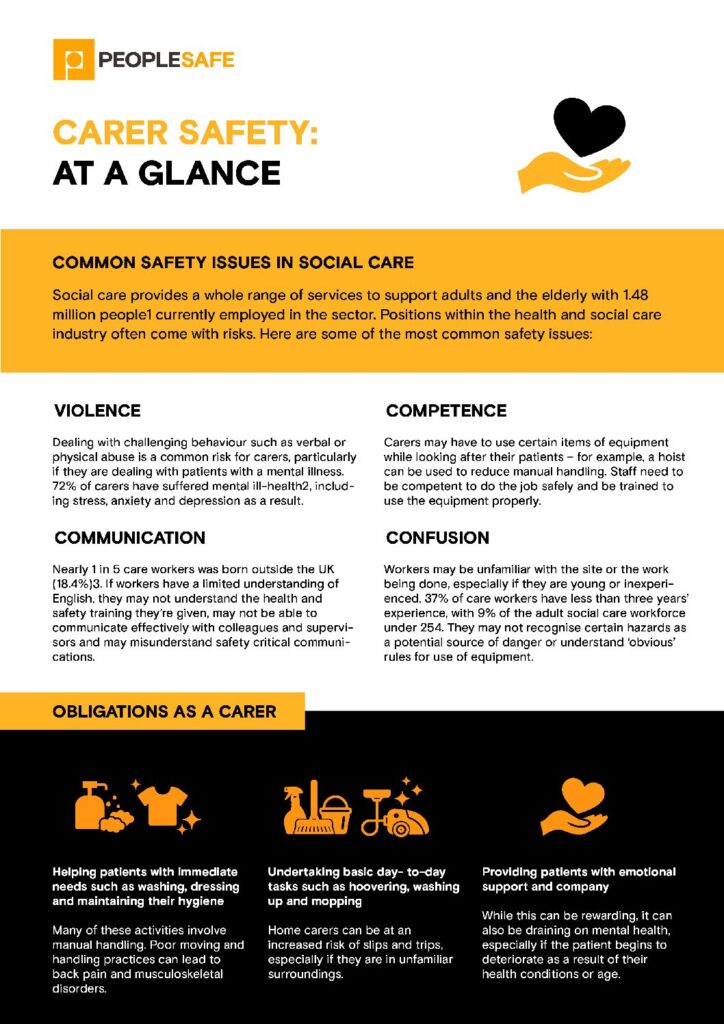Carer Safety: at a Glance
Common Safety Issues in Social Care
Social care provides a whole range of services to support adults and older people with 1.48 million people[1] currently employed in the sector. Positions within the health and social care industry often come with risks. We’ve listed some of the most common safety issues experienced by employees in this sector:
Violence – dealing with challenging behaviour such as verbal or physical abuse is a common risk for carers, particularly if they are dealing with patients with a mental illness. 72% of carers have suffered mental ill-health[2], including stress, anxiety and depression as a result.
Communication – nearly 1 in 5 care workers was born outside the UK (18.4%)[3]. If workers have a limited understanding of English, they may not understand the health and safety training they’re given, may not be able to communicate effectively with colleagues and supervisors and may misunderstand safety critical communications.
Confusion – workers may be unfamiliar with the site or the work being done, especially if they are young and inexperienced. 37% of care workers have less than three years’ experience, with 9% of the adult social care workforce under 25[4]. They may not recognise certain hazards as a potential source of danger or understand ‘obvious’ rules for use of equipment.
Competence – carers may have to use certain pieces of equipment while looking after their patients – for example, a hoist can be used to reduce manual handling. Staff need to be competent to do the job safely and be trained to use the equipment properly.
Obligations as a Carer
- Helping patients with their immediate needs such as washing, dressing and maintaining their hygiene
- Many of these activities involve manual handling – poor moving and handling practices can lead to back pain and musculoskeletal disorders
- Undertaking basic day-to-day tasks such as hoovering, washing up and mopping
- Home carers can be at an increased risk of slips and trips, especially if they are in unfamiliar surroundings
- Providing patients with emotional support and company
- While this can be rewarding, it can also be draining on mental health, especially if the patient begins to deteriorate as a result of their health conditions or age
Employer Obligations
- Legal responsibility for the health, safety and welfare of all their workers
- Record, monitor and regularly review risk assessments
- Implement effective policies and procedures (including incident and accident reporting)
- Ensure staff receive relevant training for their role
- This might include, health and safety, manual handling and conflict resolution
Top Tips For Safer Working Practices
- If you’re worried about violence from a patient, keep a clear path to the door so you don’t allow yourself to become trapped in.
- Take advantage of manual handling training and learn how to safely move people as well as items and objects.
- Understand how all the equipment you’re required to use works and make sure that it has been regularly maintained.
- Carry a personal safety alarm which can pinpoint your location and summon help in the event of an emergency.
- Wearing sensible footwear and being cautious of trailing wires will help to minimise the risk of slips and trips.
Personal safety alarm use cases
- SOS alert for verbal or physical abuse
- Fall detection after a slip or trip, or medical emergency
- Manual handling accident
- Set timers due to poor mobile signal
[1] https://www.healthcareers.nhs.uk/working-health/working-social-care
[2] https://www.carersuk.org/images/Facts_about_Carers_2019.pdf
[3] https://independent-age-assets.s3.eu-west-1.amazonaws.com/s3fs-public/2016-05/IA%20Moved%20to%20care%20report_12%2011%2015.pdf
[4] https://www.skillsforcare.org.uk/adult-social-care-workforce-data/Workforce-intelligence/documents/State-of-the-adult-social-care-sector/State-of-Report-2019.pdf

